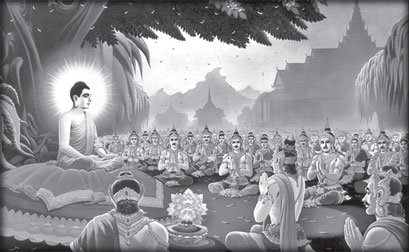|
Brahmavihara:
Buddhist tenets for boundless peace
By Lionel Wijesiri
It is a fact of life that most of us are troubled by difficult
emotional states in the pressured societies we live in, but do little in
terms of developing skills to deal with them. One of the most important
questions we come to in spiritual practice is how to reconcile
responsible action with a Buddhist life based on non-attachment, letting
go and coming to understand the ultimate emptiness of all conditioned
things.
 |
|
Among the disciples of
the Buddha were kings, queens, princes and princesses |
It is strange that the vices latent in us seem to be almost natural
and spontaneous. It is equally strange that each vice possesses its
opposite sterling virtue, which does not, however, appear to be normal
and automatic.
One powerful destructive vice in us is anger (Dosa). The virtue that
subdues this evil force and sublimes us is loving-kindness (Metta).
Cruelty (Himsa) is another vice that is responsible for many horrors
prevalent in the home and the outside world. Compassion (Karuna) is its
antidote. Jealousy (Irissa) is another vice that poisons our system and
leads to unhealthy rivalries. The effective remedy for this poison is
appreciative joy (Mudita).
Mental equilibrium
There are two other characteristics that upset our mental
equilibrium. They are attachment to the pleasurable and aversion to the
non-pleasurable. These two opposite forces could be eliminated by
developing equanimity (Upekkha).
The four virtues are collectively known in Pali as ‘Brahmavihara’.
The practice of the four Brahmaviharas involves radiating outwards the
positive qualities associated with such states of mind, directing them
first towards ourselves, then to our families, the local community and
eventually to all beings in the universe.
The Brahmaviharas are also known as the four immeasurable
(Appamanna). The Buddha held that cultivation of the four immeasurable
elements has the power to cause the practitioner to be reborn into a
Brahmaloka.
These virtues bring about positive attitudinal changes in our lives
as they systematically develop the values of moral excellence. They act
as a form of self-psychotherapy, a way of healing the troubled mind to
free it from its pain and confusion.
Metta
“Here, Bhikkhus, a disciple dwells pervading one direction with his
heart filled with loving-kindness, likewise the second, the third, and
the fourth direction; so above, below and around; he dwells pervading
the entire world everywhere and equally with his heart filled with
loving-kindness, abundant, grown great, measureless, free from enmity
and free from distress.”
- Digha Nikaya 13
The importance of Metta in Buddhism cannot be overstated. Metta is
benevolence towards all beings, without discrimination or selfish
attachment. By practising Metta, a Buddhist overcomes anger, ill-will,
hatred and aversion.
According to the Buddha, a Buddhist should cultivate for all beings
the same love a mother would feel for her child. This love does not
discriminate between benevolent people and malicious people. It is a
love in which “I” and “you” disappear, and where there is no possessor
and nothing to possess.
Karuna
“Here, Bhikkhus, a disciple dwells pervading one direction with his
heart filled with compassion, likewise the second, the third and the
fourth direction; so above, below and around; he dwells pervading the
entire world everywhere and equally with his heart filled with
compassion, abundant, grown great, measureless, free from enmity and
free from distress.”
- Digha Nikaya 13
Karuna is active sympathy extended to all sentient beings and ideally
should be combined with Prajna (wisdom). It is compassion that removes
the heavy bar, opens the door to freedom and makes the narrow heart as
wide as the world. Compassion takes away from the heart the inert
weight, the paralysing heaviness; it gives wings to those who cling to
the lowlands of self.
Mudita
“Here, Bhikkhus, a disciple dwells pervading one direction with his
heart filled with sympathetic joy, likewise the second, the third and
the fourth direction; so above, below and around; he dwells pervading
the entire world everywhere and equally with his heart filled with
sympathetic joy, abundant, grown great, measureless, free from enmity
and free from distress.”
- The Buddha, Digha Nikaya
 |
|
According to the Buddha,
a Buddhist should cultivate for all beings the same love a
mother would feel for her child |
Mudita is taking sympathetic or altruistic joy in the happiness of
others. The cultivation of Mudita is an antidote to envy and jealousy.
It is quite easy to rejoice over the success of our near and dear ones,
but rather difficult to do so over the success of our adversaries.
Sometimes, we seek delight in creating every possible obstacle so as
to ruin our adversaries. These are visible among nations, among races,
among religions and among families. The practice of Metta and Karuna is
easier than the practice of Mudita, which demands great personal effort
and very strong will-power.
Upekkha
“Here, Bhikkhus, a disciple dwells pervading one direction with his
heart filled with equanimity, likewise the second, the third and the
fourth direction; so above, below and around; he dwells pervading the
entire world everywhere and equally with his heart filled with
equanimity, abundant, grown great, measureless, free from enmity and
free from distress.”
-Digha Nikaya
Upekkha is a mind in balance, free of discrimination and rooted in
insight. This balance is not indifference, but active mindfulness. It is
not unbalanced by the passions of attraction and aversion.
Incorporating facets of this teaching in a series of increasingly
vivid similes, the Buddha says: “Bhikkhus, even if bandits were to
savagely severe you, limb by limb, with a double-handled saw, even then,
whoever of you harbours ill-will at heart would not be upholding my
teaching.
“Bhikkhus, even in such a situation, you should train yourselves
thus: ‘Neither shall (ones’) minds be affected by this, nor for this
matter shall (one shall) give vent to evil words, but we shall remain
full of concern and pity, with a mind of love, and we shall not give in
to hatred. On the contrary, (one) shall live projecting thoughts of
universal love to those very persons, making them as well as the whole
world the object of our thoughts of universal love – thoughts that have
grown great, exalted and measureless. One shall dwell radiating these
thoughts which are void of hostility and ill will.’ It is in this way,
Bhikkhus, that one should train oneself.” (Kakacupama Sutta)
Mindfulness
It is important to understand that the entire body of the Buddha’s
teaching and related practices is the prescription for the purification
of the causes of suffering. The practice of mindfulness provides the
conditions that are conducive to see the truth of suffering through to
the end of suffering. Our role is to engage the practice of mindfulness
to provide the presence of mind while becoming familiar with the “skill
in means” that allow for the slow, methodical efficient process of this
purification.
As an example, the Buddha taught that wisdom, alone, cannot bring an
end to ill-will. This can be achieved only through the practice of
Metta. With many other wholesome qualities, Metta arises spontaneously
as a condition of mindfulness.
Metta is the capacity for love. Karuna is the capacity to remain
present in the face of pain and suffering. Mudita is the capacity for
boundless, appreciative joy and gratitude. Upekkha is the capacity to be
with things as they are, in truth.
Awareness
The Buddhist concept of Brahmavihara is not a removal or escape from
life. It is seeing the world with a deeper vision that is not
self-centred, a vision that sees through dualistic views to the
underlying inter-connectedness of all of life. It is the discovery of
freedom in the very midst of our bodies and minds.
Metta, Karuna, Mudita and Upekkha will infuse our awareness, enable
us to open to and accept the truth of each moment, to feel our intimate
connectedness with all things, and to see the wholeness of life. Whether
we are sitting in meditation or sitting at home or working at office
that should be our spiritual practice in every moment.
|



